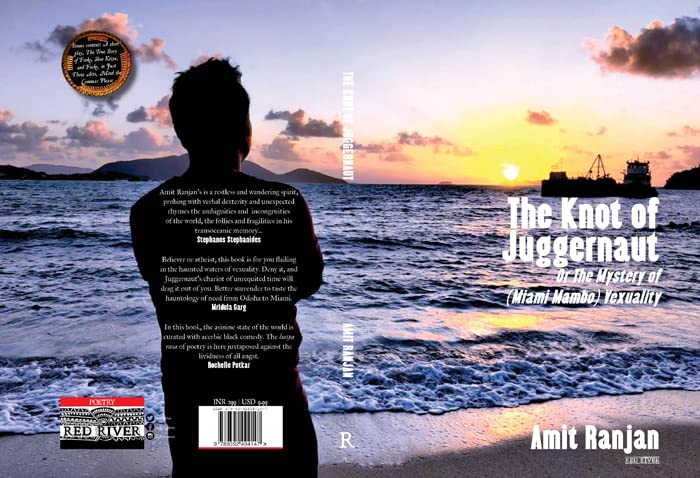


The Knot of Juggernaut, Or The Mystery of (Miami Mambo) Vexuality is a portmanteau of two separate tales. The first tale is poetry written on the waters, in Bhubaneswar and in Miami (therefore the two titles). The second is a play called The True Story of Fooko, Shoe Kriya, and Fooko, In Just Three Acts, Mind the Commas Please. The title of Amit Ranjan’s book seems longer than the contents; in fact it combines in one cover, two unrelated themes with disparate crafts. But the alchemy of wayward creativity fuses them with such dexterity that after suitable qualms, one can review them together. Fooko…, a masterly combination of witty penmanship and punmanship, is a laugh a minute play. Juggernaut, on the other hand, handles vexuality which relentlessly haunts and belittles us with pathos and near hopelessness. But…now once you allow ‘but’ to butt in, it makes your comments stand upside down. If we give a little leeway, we find Vexuality too peppered with impish punmanship and witty penmanship. The trouble with Vexuality is that once it sets out to torment sexuality, it has perforce to deal with love in some form or another.
We may proclaim that all we care for is sexuality but we know we are fooling ourselves. Love has a insidious way of creeping in and soon occupying the tent of hidden feelings like the legendary camel and holding us firmly in its grip. The author tells us that: love dries a million wishes into hisses – Of that haunted territory – which they call memory. (p87) Memory! That ultimate tormenter! A tease that plays us relentlessly as we grapple to take control over ourselves to play the tune we have practiced all our lives. In essence, both poetry and play in this two-in-one lampoon are playthings of memory and time. However they put up a brave fight to forge a magical world where they succeed in losing Time and reducing memory to risqué satire. In the play an entire Act is lost as Act V comes after Act III, not Act IV.
We are not told what happened exactly but we can conjecture that when you master two languages, you can juggle Time because its meaning differs in different languages. In some it’s immutable or eternal. In others, rebirth makes it inconsequential. It can be the past and the future while we still flounder in the present. After Act V, Fooko is bold enough to go straight to Act XXV! Fine in vernacular! A few births is all it takes.
The free flowing merger of pithy vernacular with chaste and unchaste English is what I found most invigorating and delectable in the book. The heady cocktail of wine and spirit made me inebriated as I read the poems, and it turned into full scale intoxication as I progressed to Fooko and company. It made me realize that as history has forced us to be bilingual, it is reasonable that we consecrate that coquette by using it to embellish our creativity. Falak is one such word, and the well known saki and kismet others. He feels no need to translate them into English.
Then come 2 whole couplets on p 77. Ma Farida fariyad laayi hai Ek bisri hui yaad laayi hai Aur meri amma ne mujhe ek ganna diya hai Aur likhne ke liye ek panna diya hai A pity that he found it necessary to translate those into English in the following words. “She’s brought me back to the temple of tears” made the meaning amply clear. Fortunately Ranjan got over the anxiety of Hindi not being understood in Fooko… Right from the beginning when characters are introduced by name, there are no veiled allusions to English equivalents. What if the spelling of hippotamus is not the conventional one; (deliberate and explained with grammatical flourish) there is no God of spelling or of language. It’s ours to concoct, remember or forget. Finally my answer to the last question posed in Fooko – “Are matches made in Heaven or Sivakasi?” It does not really matter because either way they are equally inflammable. But Memory is a mean adversary. You can’t guess when it would open its fangs and bite you in the face or bully you to sing fragments of lost songs, you somehow did not lose. Hence Leonard Cohen…. “I said to Hank Williams how lonely does it get Hank Williams hasn’t answered yet But I hear him coughing all night long Oh a hundred floors above me in the Tower of Song.” Ranjan’s memory is so replete with Cohen that all other worlds seem just words, like kismet. Even gods flail about without hands to fulfil kismet. How much can one handle without hands? A lot with a prodigious imagination, word play and memory full of hisses, produced by love. When you are cursed like Karna for showing valour, to forget what you need to remember, you have to concede like Ranjan in his recent poem, Han New Man Chalice. And I forgot what I had to forget And then I was told It was by dark design… (p94)